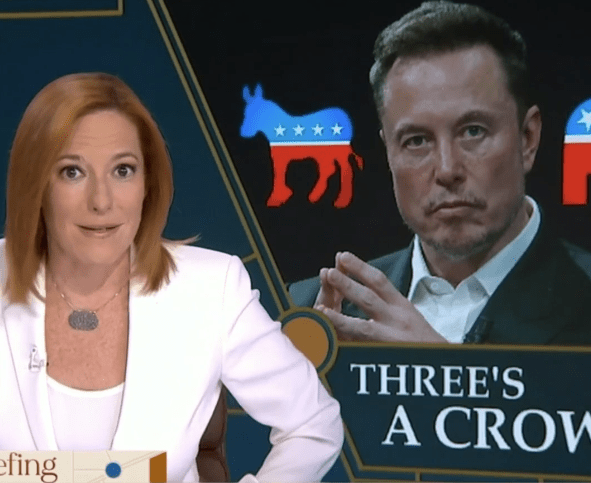Jen Psaki’s MSNBC segment exposes her deep partisan double standard. She warns that third parties act as “spoilers” who hurt the major party they’re closest to—citing elections like 2000 and 2016, where Democrats blame Ralph Nader and Jill Stein for their losses. Yet minutes later, she brings on Dan Osborn, an ‘independent’ candidate who is really just a Democrat in disguise running against a Republican.
Psaki also takes aim at Elon Musk, admitting his unpopularity with Democrat voters stems from his push to shrink the federal government. That says more about the left’s priorities than Musk’s. Apparently, limited government is no longer tolerated in the Democrat Party. Psaki’s argument boils down to this: if you challenge big government, you can’t attract any left-leaning voters.
She mocks Musk’s polling efforts, saying:
“Musk has cited his own unscientific X poll that found 80% of respondents want to see a new party. But actual polling finds that 80% of voters in both parties think rich donors like Elon Musk have too much influence in politics. They don’t need more.”
Psaki’s contradictions continue as she praises “novel reforms” like ranked-choice voting in Alaska and Maine—but only when those reforms help Democrats win. In Psaki’s world, reforms are only worth cheering when they deliver Democrat victories.
She name-drops Bernie Sanders and Angus King as examples of successful independents working with the major parties—conveniently ignoring that both caucus with Democrats and vote with them nearly every time. Her upcoming guest, Dan Osborn, fits the same mold: a Democrat-aligned “independent” running a campaign aimed solely at unseating a Republican. Psaki only condemns third parties when those parties threaten Democrat power, but celebrates “independents” who don’t challenge that power—this is a clear double standard.
Psaki said,
“Does he (Musk) want a new party because his efforts to buy one of the two major parties hasn’t worked out the way he thought it would?”
Little does she know, that is a compliment to the Republican Party.
Then she throws in a cheap insult, calling Musk “the world’s most insecure billionaire.” So much for serious political analysis.
Next, she is going to bring on and promote Dan Osborn, who is running as an independent against Republican Pete Ricketts in Nebraska.
Dan Osborn may carry the “independent” label, but in practice, his campaign has been backed by Democrat-aligned donors, embraced Democrat policy priorities, and benefited from the party clearing the field for him. That’s not independence—it’s tactical rebranding. And Psaki’s role is to sell it.
✅ 1. Democrats cleared the field for Dan Osborn
In 2024, Nebraska Democrat Party Chair Jane Kleeb and the state party backed Dan Osborn’s Senate run by clearing the field and offering support—despite his “independent” label. Heading into 2026, this strategy appears to continue, with no Democrat candidate filed against him. In reality, Osborn is the Democrat Party’s candidate in everything but name.
✅ 2. Funded by Democrat-aligned groups (2024 & 2026)
Osborn’s fundraising base heavily overlaps with the Democrat donor network.
In 2024, Dan Osborn’s independent Senate campaign raised approximately $7.96 million. The Senate Majority PAC, aligned with Chuck Schumer, contributed over $3.8 million to a super PAC supporting him, with additional funding from Democrat-aligned groups such as the Sixteen Thirty Fund and League of Conservation Voters.
In 2026, his current campaign continues to receive Democrat-aligned support, and there’s still no Democrat candidate on the ballot—a clear signal of ongoing strategic alignment.
✅ 3. Policy positions align more with Democrats
Osborn supports core Democrat priorities and policy positions. His platform diverges sharply from Republican incumbent Pete Ricketts and mirrors the Democrat Party agenda.
This segment lays out the Democrat Party’s strategy—amplified by its media allies: discredit third parties when they threaten Democrats, and elevate so-called “independents” when they’re useful. Psaki isn’t offering analysis or journalism—she’s pushing party messaging. The goal is simple: protect Democrat power by shaping the narrative around who’s allowed to challenge it.

